
Why is French Gendered? Origins and Explanations
Origins of French Gender
Purpose of Grammatical Gender
Gender in Practice
The Gender Debate
🇫🇷 The Origins of French as a Gendered Language
Ever wondered why French words are divided into masculine and feminine categories? To simply put, French is one of many gendered languages in the world. So, you may ask, where did it all begin?
French stems from Latin, which is the root of many Indo-European languages. Latin, as some might know, categorized nouns as masculine, feminine, or neuter. While French inherited this gendered structure, it eventually simplified to just masculine and feminine forms. The exact origins of how gendered language developed in French specifically remains somewhat unclear, but linguists generally attribute it to this common Latin foundation.
💡 Understanding the Purpose of Grammatical Gender
Why have genders in language at all? Isn’t it potentially sexist? Interestingly, French distinguishes between two types of gender: grammatical gender and natural gender.
Types of Gender in French
- Natural gender: Refers to animate objects that have an actual biological gender (people, animals)
- Grammatical gender: Used for nouns as a means of categorization and has no relation to biological sex
It’s important not to confuse grammatical gender with natural gender. Grammatical gender is primarily a classification system for organizing language, not a statement about the inherent qualities of objects.
Here’s a fascinating fact: English used to be a gendered language too! English speakers today are fortunate that gendering largely disappeared during the Middle English period. The primary purpose of noun gendering is to break nouns into classes, making it easier to reference various objects simultaneously.
📚 French Gender in Practice: Examples
Let’s look at how gender manifests in everyday French with articles:
| English | Masculine | Feminine | Before vowel or h- | Plural |
| the | le | la | l’ | les |
| a/an | un | une | / | des |
French also has masculine and feminine forms for many professions and descriptors:
- Actor/Actress: acteur (m) / actrice (f)
- Teacher: professeur (m) / professeure (f)
- Student: étudiant (m) / étudiante (f)
🗣️ The Gender Debate: Is French Inherently Sexist?
Does having gender in French make it a sexist language? This question prompts interesting discussions. French students learn that “the masculine dominates over the feminine” in grammar. This means if you enter a room with 20 women and only 3 men, the group must be addressed in the masculine form.
At the same time, French has evolved to include both masculine and feminine forms for many words, particularly occupations. The debate continues, and whether gendered language reflects or influences societal views on gender is a question each person must consider for themselves.
🚀 Ready to master French grammar with a native speaker?
Understanding grammatical gender is essential for French fluency. If you’re looking to perfect your French skills with personalized guidance, contact us today to book a session with a native French tutor in Hong Kong!
Tags
Interactive French
French language educator and content creator at Interactive French.
Related Posts

Which French Exam Should I Take in Hong Kong? 2026 Complete Guide & Dates
📚 French Exams in Hong Kong 2026 All French exams available in Hong Kong with…
Read More
How to Answer IGCSE French Oral Exam Questions
Interactive French > Resources > IGCSE Oral Tips How to Answer an IGCSE French Oral…
Read More
5 Proven Tips to Learn French for Beginners (From Native Tutors)
Step-by-Step Learning Practice Strategies Visual Learning Direct Approach Cultural Immersion Feeling intimidated by the complexity…
Read More